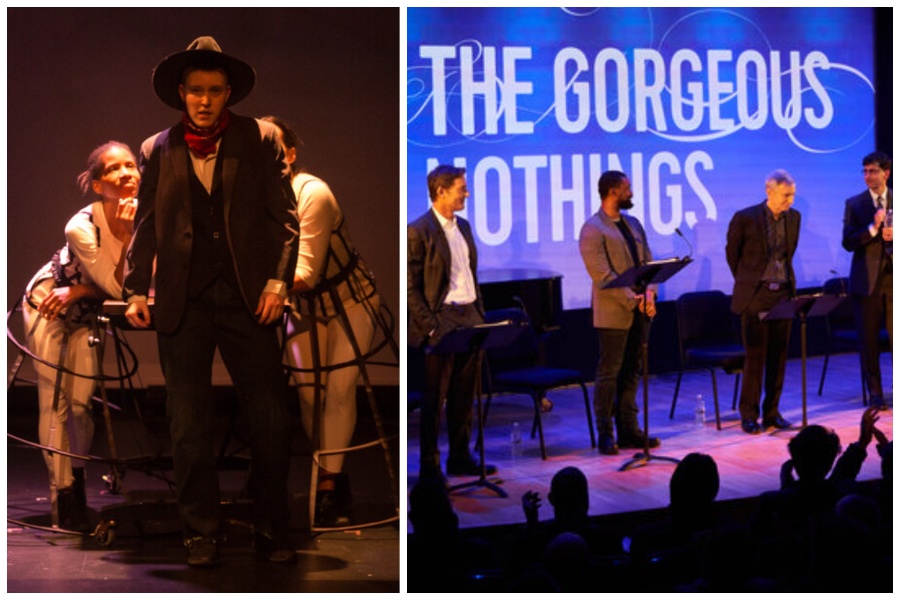This Pride month, it’s difficult to ignore the swarm of news: Since the beginning of 2023, more than 500 bills have been introduced in state legislatures attempting to limit gender-affirming care for both children and adults, and/or reduce or eliminate legal protections against discrimination for trans folks. At the same time, since the fall of Roe in the summer of 2022, access to abortion has been restricted or outright banned in nearly half of the United States. Two playwrights, Travis Russ and Melissa Moschitto, have looked back to queer history to try and understand this current backlash against hard-won rights to bodily autonomy.
Russ, artistic director of LifeJacket Theatre Company, has been developing The Gorgeous Nothings since 2017 (its most recent public reading was last December at Lincoln Center). The new musical dramatizes the true story of the so-called “Fag Ward” in the Men’s Penitentiary on Welfare Island (currently known as Roosevelt Island) in New York City during the 1930s. The ward acted as both a medical treatment and detention center for men and gender-nonconforming persons arrested for cross-dressing or for expressing or acting on same-sex attraction. Melissa Moschitto is the artistic director of the Anthropologists, an NYC theatre company whose work uses archival sources to create provoking work aimed at helping us better understand the challenges of the present. For the past five years, she has been working on No Pants in Tucson, a devised piece that stages the stories of gender-nonconforming individuals and women who dared to wear pants in the late 19th and early 20th century United States and were subsequently arrested or harassed. The play premiered at A.R.T./New York in 2021, and had a tour of the Northeast last fall.
As a dramaturg, I worked with both playwrights in the process of developing these plays, and wanted to talk with them about the importance of bringing these stories to life during a politically tumultuous time for queer and trans folks in the United States. At the beginning of this newly fraught Pride month, I sat down with Melissa and Travis to discuss their work, wrestle with the limits of language, and consider the power and importance of telling queer histories onstage.
LINNEA VALDIVIA: Both of the plays you’ve been working on—No Pants in Tucson and The Gorgeous Nothings—track stories and lives long forgotten by mainstream histories. At a time when we’re having a wider cultural reckoning with how we engage with history, I was wondering if we could talk a little bit about the importance of bringing these lost stories back to life. Why these stories, and why now? What can we learn by turning back to these historical stories during this time?

MELISSA MOSCHITTO: The first thing that comes up for me is thinking of the resistance that is being fortified by these histories. We use that in our own resistance today, especially when it feels like every day we hear about a new piece of anti-trans legislation being proposed, or some other report that the transgender community is “new” and also sort of de facto dangerous. Being able to look at these histories pushes back against both of those assumptions and reveals a lineage by which trans and gender-expansive folks and their accomplices can find internal strength and the tools by which to combat what’s happening right now.
TRAVIS RUSS: Very well said. These queer stories give us reassurance that we’re not alone now, and we haven’t ever been alone. These stories remind us that queer people have always been and will always be a part of humanity. And when I say queer, I’m including the full LGBTQ+ community, particularly our trans brothers and sisters. This type of work gives reassurance—for me as a playwright, the artists who are performing the work, and hopefully the audiences who receive the work-–that they’re not alone.
It’s interesting, the word “lost” stuck out to me when you mentioned “lost stories.” I don’t necessarily consider them lost; they’re more overlooked, under-told, or under-researched. Lost has a certain degree of finality to me. These stories are still out there, but you just need to know where to look, and you have to be persistent. Queer people have been persecuted for centuries. And as means of survival, they’ve had to go underground by changing their names, their identities, fabricating other details about their lives to remain invisible, to stay under the radar, and live their lives at a time when their queerness was harshly criminalized.
MELISSA: I really appreciate this dialogue around language. Like, is “lost” even the right word to describe these stories? What you said makes me think about the idea of these stories being in hiding or hidden, because sometimes that obfuscation comes from the person themselves as an act of protection and survival.
Can you describe the process of going through the archives to create your work? Where did the research take you in finding information? What challenges did you encounter in your search for subjects/sources?
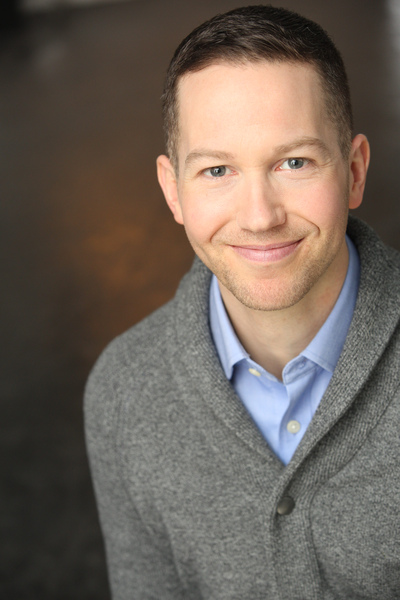
TRAVIS: When I began this project, I had been reading work by a number of gender history scholars. And there was a sentiment expressed by one of the researchers that said, if you want to learn about queer history, the best place to look is arrest records. The most obvious issue with that is that the documents are very one-sided; whether we’re talking about arrest records or trial transcripts, or psychological records that were completed in prisons, they were compiled by outside forces with distinct motivations and goals. And these documents tend to use euphemisms, coded language, and often contain innocent or intentional fabrications of the truth. It makes it very challenging to unpack what the “truth” actually is. Which, in it of itself, is a loaded word. Many of my folks changed their names or used pseudonyms, so we couldn’t even track them over time. Sometimes they would give police officers the wrong name or address, or a misspelling of their name, which was very strategic and very survival-based. But it makes it challenging for archivists to go back into these official records and track their lives. These intentional or unintentional fabrications throw us off course.
MELISSA: Especially when you consider the practice of the time, where local and city newspaper articles would print the full name, address, and charge for everyone who was arrested. They were essentially doxing people before that was even a thing. From the archival research I’ve done for other plays, this seems to be a common practice across the board. So it’s no surprise then that the people in the queer community were using different ways to obscure their identity to protect themselves.
TRAIVS: Newspapers would even report where they worked, their employer.
MELISSA: That reminds me of one of the people we highlight in No Pants in Tucson, Ralph Kerwineo. Ralph was from Milwaukee and lived much of their adult life as a man, though they were assigned female at birth. Their first wife, in a moment of revenge after being abandoned by him, outed Ralph to the police, and he was subsequently brought to trial for masquerading as a man. And the trial did include their employer. Ralph’s ex had hoped that the shock and outrage from his employer would get him in further trouble, but in the court transcript, his employer just verified that Ralph was a really good employee, which was a beautiful moment of acceptance, actually.
TRAVIS: Melissa, you honed in on these flashes of acceptance and forward thinking that I’ve also seen in our research, albeit infrequently. It’s interesting that you’ve spotlighted that in your research. Maybe I need to revisit those moments of radical inclusiveness and openness, because, even though it was uncommon, it certainly happened. Sometimes we think that people throughout history were very small-minded and provincial in their thinking. And that was true in a sort of a general sense, but not everyone. In fact, there were pockets of acceptance in New York City and throughout America. They were just hidden. And the oppressive voices were louder than theirs. And because we’re focused on legal individuals—lawyers, judges, social workers—they had formal power that increased the weight of their perspective in society.
We’ve been talking about the power and limitations of language, but I want to dig into a linguistic issue specific to engaging with queer historical subjects. Many of your subjects or characters were gender-nonconforming in some way during the time in which they lived, but did not have access to the same frameworks about gender and sexuality that we have today. Can you talk a little bit about what’s like coming up against these kinds of disconnects in vocabulary? What do you feel you owe your subjects in that way?
TRAVIS: This is a question I’ve been wrestling with, and, frankly, I don’t have the perfect answer. The best approach I have right now is meeting my characters where they are—understanding who they were on their own terms. I’ve been doing a lot of reading by folks who write about queer people throughout history, and some argue that trying to retroactively place our language onto these individuals is actually erasing or altering their identity—how they saw themselves. My job, as I see it, is to try and unpack the lives of these individuals who are long gone by now and do my best to understand the public and private lives they led, either by choice or force.
MELISSA: Grappling with language made us more creative and adventurous in trying to encapsulate these characters and understand them through our perspective in 2023. The individuals we engaged with in the research were dressing “as men” for a variety of reasons: because of how they wanted to express their gender, or because of how they wanted to live their romantic lives, or because they wanted to get paid as much as men, or because they wanted to vote, or because it was more comfortable than wearing a hoop skirt and petticoats, or because it was cheaper. Though in some cases our subjects would clearly and directly claim one gender or another, for many it was not quite as clear.
We had to learn to balance this adventurous spirit with understanding the antiquated, often outdated language in order to navigate the archives, even when it didn’t necessarily have to do with gender. When we were engaging with the stories of non-white individuals, we encountered a lot of antiquated language used by newspapers or official documents to capture the stories of these people. Having that understanding helped us find those stories in the archive and locate those people in their respective cultural context.
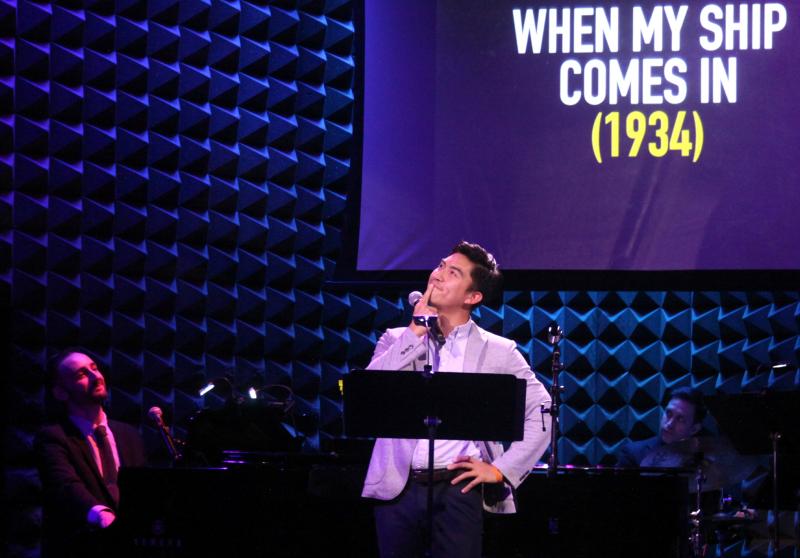
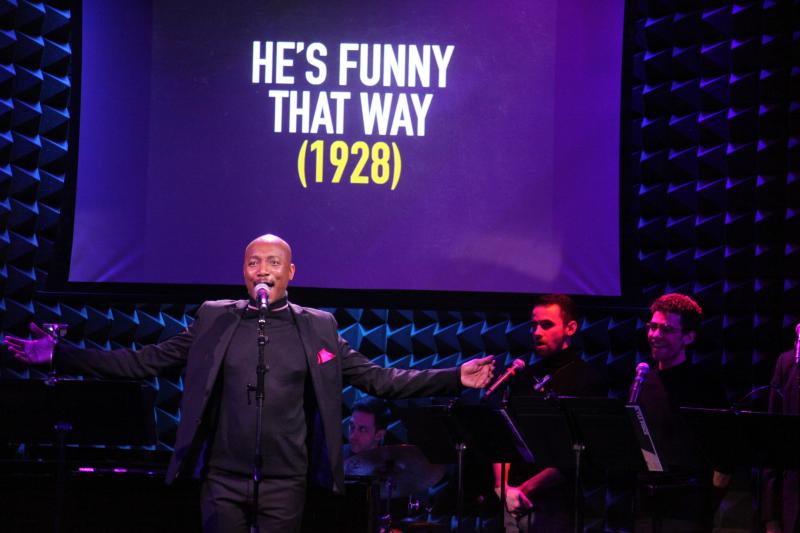
TRAVIS: For The Gorgeous Nothings, we’re completing extensive genealogy research to uncover the lineages of all our characters, because we want to know their life stories from cradle to grave. Of course, it is extremely difficult to do this research for people who were born 100 years ago. It has been even more difficult to investigate non-white individuals, who seem to have just dropped out of the archives after their encounters with the law. White supremacy is clearly at work in archival documents, and present in how we preserve and categorize our archival records. The archive erases queer identities in the same way it obfuscates and flattens non-white identities.
It is challenging as a playwright to ascribe identities to individuals who lived over 100 years ago. There’s only one person in the world who can say who they are, and that’s that person. Part of the play is about the journey. Even as a gay individual, I don’t know if it’s helpful to explicitly say an individual is gay. I understand the intent—the impulse to “claim” these people—but to me, it’s not about a label. It’s a complicated issue.
Speaking of identity, you identified yourself as a playwright just now. If we think about the word “historian” as somebody who writes history, or somebody who tells (hi)stories, would either of you consider yourselves historians in this work?
MELISSA: [Laughter] I think I just flashed back to middle school, when I really did not like history class. I began to like it in high school, but it still wasn’t a super dynamic place to be. But engaging in this type of theatremaking—creating research-based investigative devised work as an ensemble—ignited my love of history. So I don’t know, I don’t want to get the academic community mad at me, but part of me is like, well, if I’ve introduced people to a history that they knew nothing about, if I gave them that gift, then maybe there’s a little bit of a historian in me.
TRAVIS: I don’t think of myself as a historian when I am in the role of a playwright. When I’m writing, I think of myself as a storyteller who has the liberty to use creativity and theatrical invention when telling this story about our queer ancestors.As we discussed, there are significant gaps in the historical records that I have unearthed, and they are very one-sided. Therefore, for theatrical and storytelling reasons, I have taken a number of liberties in writing this play. But I also know that it is my responsibility as the writer to be very clear with my audiences, telling them that what they’re watching is inspired by real people and events. It is not a factual, unbiased account.
MELISSA: I appreciate that distinction so much, Travis. We also make it clear that we’re not making documentary theatre. There are times where we have to fill in details, but we’re never inventing major aspects of somebody’s story, unless we’ve made it clear in the story that it’s a fantastical or surrealist exploration. In No Pants in Tucson we always strive to lead with integrity as we comb those records for their truth, and to be okay with ambiguity onstage in the pursuit of that goal.
TRAVIS: And complexity. There were instances where we found facts that seemed to contradict each other in the records. This could arise from errors in the transcript or survival-based fabrications from the subjects themselves. How do you mesh seemingly contradictory truths in a way that doesn’t water down or muddy the story? Often, it’s not about softening the edges, it’s actually spotlighting the contradiction. To me, that’s the exciting part. We’ve thrown around the word “truth” a number of times; truth is very exciting on stage because there are often multiple versions of the truth. As a playwright, I’m more interested in emotional truth and theatrical truth than factual truth, which to me probably doesn’t even exist.
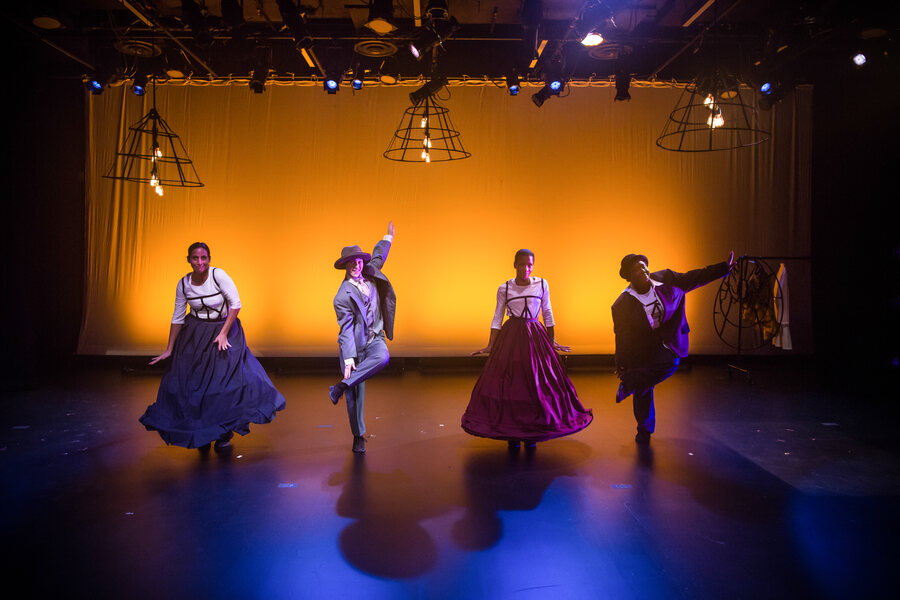
We’ve kind of touched on this a little bit, but I’m wondering if you two could speak to the utility of performance for telling these stories. Travis, you just brought up the importance of multiple truths coexisting at once and getting to play with the stickiness of that. But why do these (hi)stories demand to be performed?
MELISSA: Placing these people onstage in three-dimensional form, in all of that complexity, is essential. When people come to see our work at the Anthropologists, we hope that they leave ignited by the performance and inspired to go and dig deeper into the histories we are telling. I view my work as a form of social inquiry, because the real magic happens when someone sees themselves reflected onstage. Sometimes I get the privilege of hearing that from an audience member. Sometimes I can only intuit that by someone’s response after seeing the show. While the body of literature and academic research around queer history is growing, I think that it is strengthened by being able to see those individuals onstage, both for a performer to be able to embody facets of themselves onstage and for an audience to see that person made real.
TRAVIS: Throughout history, queer people have been suppressed, vilified, criminalized, and oppressed. They have been forced to the margins—to the back of that proverbial closet. Theatre gives us an opportunity to shine a light to the back recesses of that proverbial closet and show the modern queer community that our lineage is long, complicated, and beautiful. Theatre gives us a chance to tell those ghost stories, to bring our ancestors back to life centerstage and reclaim their place in history. It’s a reclamation of their place in history. It’s reclaiming their story. And it’s a restoration of their agency by making them the lead characters in the story rather than the victims. Tragic heroes, maybe, but I enjoy my tragic heroes. Yes, these people might be flawed, but they become the heroes we are rooting for to cross the finish line in the play.
That’s beautifully said. Do either of you have any final thoughts?
MELISSA: Something I think is important to speak to is how interconnected bodily autonomy and queerness are. After Roe fell, we saw a whole host of anti-abortion laws from the 1800s being reactivated across the United States that we had been exploring in our plays. It was surreal and enraging. These two issues are being very explicitly put into the same bills to punish queer and gender-expansive folks and women for trying to exercise autonomy over their bodies. I think the more that cis women understand that the future of their bodies is tied up in the rights of trans and gender-expansive folks, the more powerful we can be. And it is to our detriment if we keep the binary thinking around that.
TRAVIS: I would add that the reverse is true—that gay men need to understand that our rights are inextricably linked to rights for women, and equitable healthcare for women. Trans rights are also linked to both of those populations. It’s imperative for marginalized populations to look out for each other. Because when one group is oppressed, we are all oppressed.
MELISSA: Audiences need both of these shows, not only because they offer a more complete representation of humanity, but because they expose the playbook of the people and movements that are actively working against gender justice.They place the struggles of today in a larger historical context and make them harder to ignore.
Linnea Valdivia (she/they) is a professional freelance dramaturg, producer, and arts writer based in San Luis Obispo, Calif. Their artistic focus is on new work development with specialties in queer and Latiné stories.

